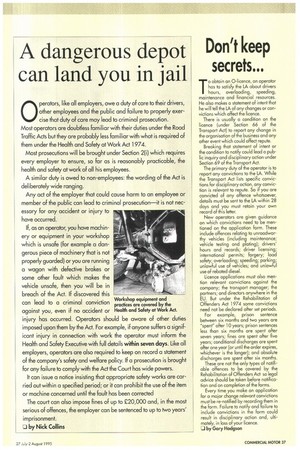Don't keep secrets...
Page 39

If you've noticed an error in this article please click here to report it so we can fix it.
To obtain an 0-licence, an operator has to satisfy the LA about drivers hours, overloading, speeding, maintenance and financial resources. He also makes a statement of intent that he will tell the LA of any changes or convictions which affect the licence.
There is usually a condition on the licence (under Section 66 of the Transport Act) to report any change in the organisation of the business and any other event which could affect repute. Breaking that statement of intent or the condition to notify could lead a public inquiry and disciplinary action under Section 69 of the Transport Act.
The primary duty of the operator is to report any convictions to the LA. While the Transport Act lists specific convictions for disciplinary action, any conviction is relevant to repute. So if you are convicted of any offence whatsoever, details must be sent to the LA within 28 days and you must retain your own record of this letter.
New operators are given guidance on which convictions need to be mentioned on the application form. These include offences relating to unroadworthy vehicles (including maintenance; vehicle testing and plating); drivers' hours and records; driver licensing; international permits; forgery; load safety; overloading; speeding; parking; unlawful use of vehicles; and unlawful use of rebated diesel.
Licence applications must also mention relevant convictions against the company; the transport manager; the partners; and directors anywhere in the EU. But under the Rehabilitation of Offenders Act 1974 some convictions need not be declared after set periods. For example, prison sentence between six months and iwo years are "spent" after 10 years; prison sentences less than six months are spent after seven years; fines are spent after five years; conditional discharges are spent after one year (or until the order expires, whichever is the longer); and absolute discharges are spent after six months. These are not the only types of notifiable offences to be covered by the Rehabilitation of Offenders Act so legal advice should be taken before notification and on completion of the forms. Every time you make an application for a major change relevant convictions must be re-notified by recording them in the form. Failure to notify and failure to include convictions in the form could result in disciplinary action and, ultimately, in loss of your licence.
CI by Gary Hodgson
























































































